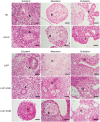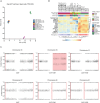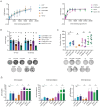Depletion of TP53 in Human Pluripotent Stem Cells Triggers Malignant-Like Behavior
- PMID: 39760438
- PMCID: PMC12001006
- DOI: 10.1002/adbi.202400538
Depletion of TP53 in Human Pluripotent Stem Cells Triggers Malignant-Like Behavior
Abstract
Human pluripotent stem cells (hPSCs) tend to acquire genetic aberrations upon culture in vitro. Common aberrations are mutations in the tumor suppressor TP53, suspected to confer a growth-advantage to the mutant cells. However, their full impact in the development of malignant features and safety of hPSCs for downstream applications is yet to be elucidated. Here, TP53 is knocked out in hPSCs using CRISPR-Cas9 and compared them with isogenic wild-type hPSCs and human germ cell tumor lines as models of malignancy. While no major changes in proliferation, pluripotency, and transcriptomic profiles are found, mutant lines display aberrations in some of the main chromosomal hotspots for genetic abnormalities in hPSCs. Additionally, enhanced clonogenic and anchorage-free growth, alongside resistance to chemotherapeutic compounds is observed. The results indicate that common TP53-depleting mutations in hPSCs, although potentially overlooked by standard analyses, can impact their behavior and safety in a clinical setting.
Keywords: TP53; genetic aberration; human germ cell tumor; human pluripotent stem cell; malignancy; pluripotency.
© 2025 The Author(s). Advanced Biology published by Wiley‐VCH GmbH.
Conflict of interest statement
The authors declare no conflict of interest.
Figures




References
MeSH terms
Substances
Grants and funding
LinkOut - more resources
Full Text Sources
Research Materials
Miscellaneous

